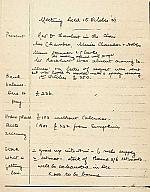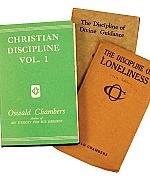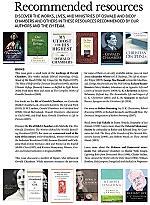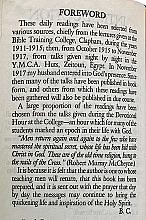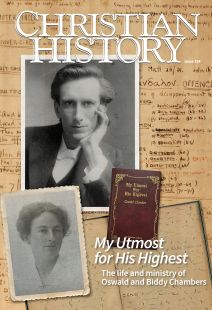Faithful legacies
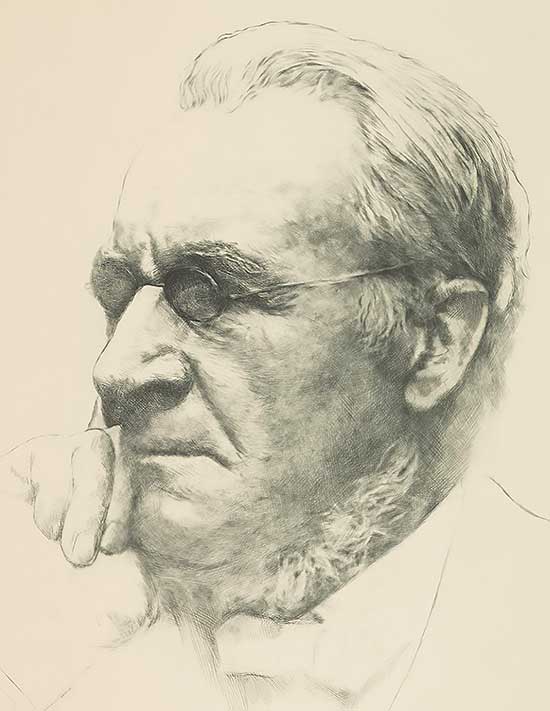
[Above: R .S. Forrest, Rev. Dr Alexander Whyte, early Twentieth Century. Etching on paper—Purchased 1938, National Galleries of Scotland]
CHARLES H. SPURGEON (1834–1892)
The oldest of 17 children, Charles Spurgeon (see CH #29) was born in Essex, England. He accepted Christ as a teenager and began itinerant preaching.
Only four years after his conversion, at the age of 19, he was called as pastor to New South Street Chapel, the largest Baptist church in London at the time. So quickly did his sermons gain fame that they were printed each week and had high circulation.
In 1856 Spurgeon founded his Pastors’ College, which Clarence Chambers, Oswald’s father, attended in its earliest years. Six years later Spurgeon’s congregation moved to the largest to-date church building of its kind at the Metropolitan Tabernacle, which held 6,000 people. The church complex also included various societies and institutions, such as an alms house, orphanages, and health infirmaries.
When Oswald Chambers was a teenager, he and his father visited the Metropolitan Tabernacle to hear Spurgeon preach soon after they moved to London. After hearing Spurgeon’s call to follow Christ, the young Chambers gave his life to Jesus on the walk home that night. Though Chambers had been raised in a loving Christian home, Spurgeon’s sermon still changed the trajectory of Oswald’s life.
Spurgeon preached to approximately 10 million people in his life and wrote more than 3,500 sermons; his speaking and writing styles were easy for his lay audiences to understand. He encouraged average Christ-followers to delight in small things.
You can only give away a tract in the street. . . . Souls have been saved by the distribution of tracts and sermons. Scatter them, scatter them. . . . You can only write a letter to a friend about Christ. Don’t neglect to do it: write one tomorrow. . . . Mother, it is only two or three little children at home that you have an influence over. Despise not the day of small things. . . . God accepts your little works if they are done in faith in his dear Son.
Spurgeon was unwell for much of his adult life, suffering from gout and other ailments. He died at age 57 in the south of France and was buried in London. Massive crowds stood along his funeral route to honor the great preacher and teacher.
ALECANDER WHYTE (1836–1921)
Widely regarded as the preeminent Scottish preacher of his time, Alexander Whyte was born in Kirriemuir, Scotland, to a young, unmarried woman named Janet Thomson. His mother joined the Free Church of Scotland during the Disruption of 1843, when a large group of congregants left the Church of Scotland over disagreements concerning the true head of the church. The Church of Scotland gave Parliament and the British Crown the power to make clerical changes, whereas the Free Church of Scotland wanted to leave church matters to those within individual church bodies.
After apprenticing as a cobbler, Whyte became a schoolteacher in 1854, and a local pastor taught him Latin and Greek. He thus was able to attend university to study theology. He subsequently served both as minister in the Free Church of Scotland and as a professor of the New Testament. He authored numerous books and was an ecumenist, corresponding often with Cardinal John Henry Newman (1801–1890).
While Oswald Chambers was an art student at the University of Edinburgh in the mid-1890s, he discovered the teachings of Alexander Whyte. Whyte was an erudite and charismatic preacher, and after Sunday evening services, Chambers and other young men would remain behind to hear more teachings from him on the Bible and the biographies of well-known Christians. While in Edinburgh Chambers felt called away from a career in art and toward full-time ministry, soon entering Dunoon College near Glasgow to start his theological training.
Whyte, an impassioned preacher and a constant student, was also a man dedicated to prayer. One can imagine Whyte’s words sinking into a young Chambers’s heart:
No prayer! No faith! No Christ in the heart. Little prayer! Little faith! Little Christ in the heart. Increasing prayer! Increasing faith! Increasing Christ in the heart! Much prayer! Much faith! Much Christ in the heart! Praying always! Faith always! Christ always!
Whyte died at the age of 84, having served in ministry into his eighties.
CLARENCE CHAMBERS (c. 1837–1925)
Clarence Chambers, Oswald’s father, was born in Kent, England. He and his wife, Hannah, were Baptists and were both baptized by Charles Spurgeon in the Metropolitan Tabernacle in London. Clarence, in fact, was one of the first students in Spurgeon’s Pastors’ College. Clarence and Hannah were subsequently involved in D. L. Moody’s (1837–1899) revival movement when he visited England.
By the time Oswald was born, Clarence had served as the minister of Crown Terrace Baptist Church in Aberdeen, Scotland, for 10 years, the church’s longest tenured pastor. Two years later, Clarence and Hannah moved their family from Scotland to Stoke-on-Trent, England. There Clarence became an evangelist for the North Staffordshire Baptist Association. He later moved the family back to Scotland where Clarence returned to the pastorate. Then, in 1889, Clarence and the family settled in London, where he served in the Baptist Total Abstinence Association.
His new position in the Baptist Total Abstinence Association was as one of two traveling secretaries. The job required a challenging travel schedule of visiting churches from Scotland down to Wales and throughout England. For nearly two years, Oswald’s father was away from home serving in ministry. During this time, Oswald was a teenager, and his mother served as his primary parental influence as he settled in at the family’s new church home, Rye Lane Baptist Chapel
in London.
Oswald and Clarence often did not see eye-to-eye on practical issues, including aspects of the ministry. Kathleen Chambers recalled of their relationship,
My father loved my grandfather very much, but of course, they disagreed, you see, very, very fundamentally and very strongly.
Ultimately Oswald came to appreciate his father and the Christian upbringing he provided. He lovingly described his family as “God’s institution.” Indeed Clarence influenced Oswald’s decision to enter the ministry and Oswald’s earliest preaching reflected Clarence’s severe preaching style.
Clarence outlived his son by some eight years, dying in 1925 after a life of faithful Christian service.
J. T. “PA” BRISCOE (dates unknown)
When the Chambers family moved to London in 1889 for Clarence Chambers’s new job in the Baptist Total Abstinence Association, their new home was a short distance from Rye Lane Baptist Chapel, founded in 1818. The church had grown to 800 members after Rev. J. T. “Pa” Briscoe took the helm in December 1876.
As many as 1,000 people gathered to worship and to hear Briscoe on Sundays. David McCasland wrote that
[His] warmth melted every barrier of position and distance between him and the congregation. It was “Pa” Briscoe speaking fervent, unforgettable words of encouragement from God.
With Clarence Chambers often traveling in his new position, Oswald’s mother, Hannah, soon got the family involved in Rye Lane Baptist.
Briscoe was a talented preacher, and his congregants described his sermons as “interesting and eloquent.” He had a passion for evangelizing and an interest in finding young, willing workers for God’s kingdom. If Briscoe saw a young person sitting in his pews week after week, he would sometimes ask in the middle of the evening service, “Why are you here instead of out doing evangelism at one of the missions?” Briscoe preferred workers in the kingdom over those filling pews to hear him preach.
A Colorado newspaper in 1886 cited Briscoe’s attitude toward punishing children, revealing his heart for the Bible. Often when nineteenth-century children misbehaved, Christian parents would require them to memorize Bible verses as punishment. But Briscoe found this abhorrent, believing it made the Bible a book of terror, a book children hated. Instead Briscoe desired that children would find reading the Bible a privilege and a joy. The newspaper wrote:
The bible, he thought, was the best story book in the world for boys and girls, and if children must read stories they ought to read the best stories—that is, the bible ones.
When Oswald Chambers was 16 years old, he was baptized by Reverend Briscoe and received as a member of Rye Lane Baptist Chapel.
DUNCAN MACGREGOR (1842–1913)
Highland-born Rev. Duncan MacGregor was the pastor of Dunoon Baptist Church and founder of Dunoon Bible College. Dissatisfied with the lack of robust education for his own denomination’s ministers and the state of theological training in general, MacGregor started the Gospel Training College in 1893 and served as its principal. He initially ran the college out of his own home.
When Chambers arrived at Dunoon, MacGregor took the young man under his wing. They became fast friends, with MacGregor discipling him as a son in the faith. Chambers received many opportunities to grow his gifts with MacGregor’s help, teaching at the college and preaching in MacGregor’s church. When MacGregor fell from his roof and nearly died, Chambers personally cared for him and kept Dunoon Bible College running.
MacGregor’s mentorship left an indelible mark on Chambers, who went on to disciple young men and begin his own Bible Training College just as MacGregor had.
RICHARD READER HARRIS (1847–1909)
Richard Reader Harris was the son of the chief constable of Worcestershire, England. Reader Harris first apprenticed as a railway engineer, and excited to travel, he moved to Bolivia for a year to help establish its railway systems. When he returned to England, he began his training as a lawyer.
Reader Harris was first influenced by Charles Bradlaugh’s (1833–1891) Ethical Society. Bradlaugh was an atheist who nevertheless advocated for living out Jesus’s teachings in the Sermon on the Mount. But merely following Jesus’s teachings without regarding him as God didn’t satisfy Reader Harris, and he converted to Christianity as a young man. He married Mary Griffin Bristow in 1880.
By 1891 he and his wife had founded the Pentecostal League of Prayer, an interdenominational group dedicated to prayer and revival. He would preach most days at their London headquarters, and he used his lunch hour to walk around the city wearing a sandwich board inviting interested people to attend meetings. Reader Harris and Oswald Chambers met at Dunoon College in Scotland. They became fast friends. In 1905 Reader Harris described Chambers as “a new speaker of exceptional power.” Through the Pentecostal League of Prayer, Chambers also met Juji Nakada, a Japanese evangelist, who inspired Chambers’s interest in global evangelism.
In 1907 Reader Harris published the book The Lost Tribes of Israel, in which he rather controversially claimed that the Anglo-Saxons were descended from the 10 lost tribes of Israel.
Reader Harris suffered a serious stroke and died in 1909 at the age of 61. After Harris’s death, Chambers kept contact with the widowed Mary Reader Harris and the Pentecostal League of Prayer which she then led on her own. The league purchased a building for Chambers to start his Bible Training College in London in 1911. There he trained missionaries, with 40 serving in the mission field by 1915. That same year, Chambers suspended the school’s work to move to Egypt to minister to soldiers based there during World War I.
JUJI NAKADA (1870–1939)
Juji Nakada was born in northern Japan to a Samurai father and a Christian mother. His father died when he was a young boy, and thereafter his mother took Juji and his brother to a Methodist church. Though he attended university in Tokyo, he was more interested in judo and didn’t graduate. He was married in 1889, and after being recognized as a gifted speaker and evangelist by his pastor, he was sent out as a missionary to remote parts of Japan in 1891.
After traveling and preaching, Nakada knew Japan needed more than just his preaching to spread Christ. He decided to enroll in the Moody Bible Institute in Chicago in 1896 to learn more as an evangelist. He soon became friends with Charles Cowman (1868–1924), a Western Union executive, and his wife, Lettie (1870–1960), author of Streams in the Desert and Springs in the Valley. Lettie wrote of Nakada:
As he earnestly sought to be filled with the HOLY SPIRIT, it was not long until his hungry heart was satisfied. Having come so definitely into the blessings, he soon felt strongly impressed that GOD would send him back to his people to preach full salvation to them.
Nakada returned to Japan in 1898 and subsequently cofounded the Oriental Mission Society and the Tokyo Bible Institute in Tokyo, funded in large part by the Cowmans, who also moved to Japan as missionaries. Nakada also served as a chaplain to troops during the Russo-Japanese War.
In 1906 Nakada traveled to England for spiritual rest, and there he befriended Oswald Chambers at the Pentecostal League of Prayer in London. Through 1906–1907, the friends traveled to the United States to teach at a Bible school in Ohio and then went on to Japan to work with Charles Cowman at the missionary society in Tokyo.
Nakada continued preaching and teaching in Japan and came again to America in 1920 to preach at Japanese holiness churches in Los Angeles. Nakada was often referred to as the “D. L. Moody of Japan,” and the mission society he cofounded with the Cowmans and others still exists in 81 countries as the One Mission Society. Nakada died in 1939 at the age of 68. CH
By Jennifer A. Boardman
[Christian History originally published this article in Christian History Issue #154 in 2025]
Jennifer A. Boardman is a copyeditor and writer. She holds a master of theological studies from Bethel Seminary with a concentration in Christian history.Next articles
Recommended resources: Oswald Chambers
Discover the works, lives, and ministries of Oswald and Biddy Chambers and others in these resources recommended by our authors and the CH team.
the editors and authorsQuestions for reflection: Oswald and Biddy Chambers
The lives and legacies of Oswald and Biddy Chambers
the editors



